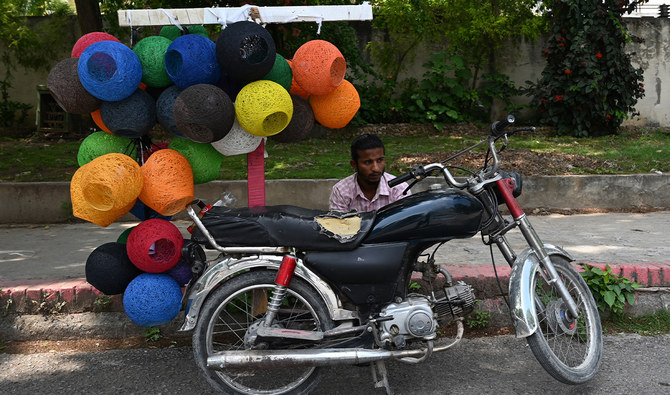KARACHI/LAHORE: Salma Faheem has not spoken to her husband, Mohammad, since June. That’s when he dropped her and their three children off in his home village of Dalma in Pakistan’s northwestern Khyber Pakhtunkhwa province because he could no longer afford to have them living with him in the southern city of Karachi.
Now instead of living in one room in an urban slum with water on tap and a gas-powered cooker, Salma has to walk an hour every day to fetch water and she must cook her family’s meals on a wood-fired stove.
“I hate it here,” she said by phone. “I loved it in Karachi.” Her husband is not happy either but he feels he had no choice.
Cash-strapped Pakistan’s $350 billion economy is in meltdown with low growth, a weak currency and spiralling prices.
The pain is being felt most keenly by those living on low incomes in cities. Some have decided that the only answer is to leave or to send their families back to their home villages, where they can live more cheaply thanks to family networks and assets.
Faheem, 33, found the 35,000 rupees ($123) he earns a month as a furniture handler and loader could no longer stretch to cover food, rent and tuition.
“In the village, the house is ours so it is rent-free,” he said. “(But) I loved having them around. I miss my children.”
Like other developing countries, Pakistan is heavily reliant on imports of oil, gas and other commodities, and has been hit hard by the Covid pandemic, the global slowdown that followed the war in Ukraine and floods last year that submerged a third of the country.
High fuel and energy prices have pushed inflation to 31.4 percent year-on-year in September, up from 27.4 percent in August, and there is little the new caretaker government, which took over in August, can do to rein in prices.
A $3 billion loan program, approved by the International Monetary Fund (IMF) last July, averted a sovereign debt default but reforms linked to the bailout, including an easing of import restrictions and a demand that energy and fuel subsidies be removed, have thrown oil on the inflation fire. The economic crisis is exacerbated by rising political tensions ahead of a national election scheduled for January.
With no relief in sight, some people in this nation of around 240 million are cutting costs the only way they can: by moving home to their villages.
“The decision to return to our hometown was not an easy one,” said Waseem Anwar, who moved with his wife and five children to the small dusty town of Chowk Marlay — about four hours from Lahore — in May.
His wages as a water filter and sanitary fittings installer could no longer cover rent, utilities, medical expenses and tuition in the city.
“Although the work opportunities here are not as plentiful, the reduction in my overhead expenses to about half ... has provided great relief,” said Anwar, who now works as a plumber.
'ALLEVIATE SUFFERING'
There is no immediate data available on the total number of people who have moved back to villages in recent months, but researchers cite substantial anecdotal evidence based on dozens of conversations with so-called reverse migrants and their relatives.
One reason that hard figures are difficult to come by is because the 2023 Census operation meant the labor force survey, normally carried out every two years by the Pakistan Bureau of Statistics, has been delayed indefinitely, explained Bilal Gilani, executive director of research firm Gallup Pakistan. “The labor force survey is the main data source for migration and reverse migration,” he said, noting however that other surveys provided evidence of some population movements.
“Many of our surveys suggest that cutting costs is a major way by which people are surviving this flood of inflation as other forms of mitigation, such as doing more hours or a second job, are also not available,” said Gilani.
“Avoiding rent in (the) city by sending families back to rural areas or avoiding food costs by returning to villages where there is own-grown wheat, and meat and milk through owned livestock provides a cover.”
While the government has said it expects inflation to ease eventually, it warned that prices would remain high in November due to an upward adjustment in energy tariffs and a major increase in fuel prices.
“We cannot change the economic direction of the country because of our limited mandate, but we are trying to alleviate the sufferings of our people,” caretaker Prime Minister Anwaar-ul-Haq Kakar told the Thomson Reuters Foundation.
“Our action against illegal foreign exchange speculators, wheat, sugar and fertilizer hoarders, and smugglers of oil products has paid off,” he said, adding that authorities had also recovered over 15 billion rupees from electricity thieves.
The South Asian nation’s power sector has been plagued by high rates of power theft and distribution losses, resulting in accumulating debts across the production chain.
TOO LITTLE, TOO LATE?
A finance ministry official, who sought anonymity as they were not authorized to speak to the media, said the government had rolled out a range of targeted social safety net programs aimed at income support, food assistance, and health care.
For example, the Benazir Income Support Program (BISP), with a budget of 471 billion rupees for the current financial year, disburses payments to more than 9 million families.
Other schemes help enrol millions of children from low-income homes into schools and provide health care and cash transfers to prevent child stunting, which affects 40 percent of children aged under five.
“We are fully committed to ensuring that the most vulnerable segments of our society are protected during these trying times,” the official said by phone from the capital Islamabad.
Policy experts say the government should support poor households by lowering taxes, such as sales levies, in the short term and introducing a targeted subsidy system, which could help narrow the fiscal deficit.
“If even a part of the untargeted subsidy to energy (among others) can be targeted, it would make a big difference,” said Haris Gazdar, director at the Karachi-based Collective for Social Science Research.
Gazdar said that while the recent trend of reverse migration would not have major economic impacts immediately, because workers would likely return to cities once the economy picked up, it could lead to “longer lasting” problems with, for example, many children being taken out of schools.
He urged Pakistan to learn from countries like the United States, where social security benefits kick in when someone becomes jobless, and neighboring India, where citizens can enrol for work, such as building roads, digging wells or creating other rural infrastructure, and receive a minimum wage for at least 100 days each year.
“These are responsive systems, which we do not yet have and would need to work toward,” said Gazdar.
It may all be a little too late for those already pushed to the financial limit, people like Muhammad Aslam, Waseem Anwar’s older brother, who lives in Lahore.
“Even after my brother’s return to our hometown, I managed to keep afloat. But mounting financial pressures are beginning to weigh me down,” said Aslam, also a plumber, adding that he owes his landlord three months’ rent.
“If circumstances do not get better soon, I’m afraid I may be the next one forced to make the journey back home.”
($1 = 284.5000 Pakistani rupees)



















